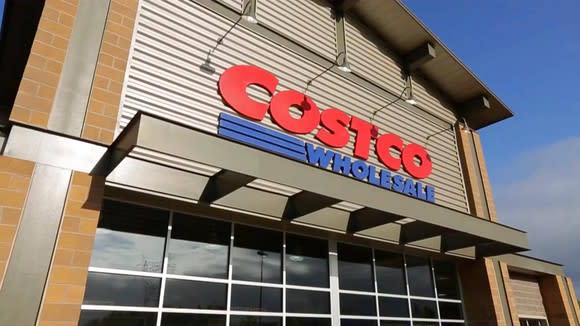Costco Wholesale Corporation Just Silenced the Doubters
Two months ago, Costco Wholesale (NASDAQ: COST) stock crashed after the company released its fourth-quarter earnings report. Earnings per share came in $0.06 above the average analyst estimate, but investors were concerned about a downtick in member retention. Many also felt that Costco didn't have a coherent strategy for competing with e-commerce juggernaut Amazon.com (NASDAQ: AMZN).
Costco's recent sales results suggest that these worries were overblown. The company continues to enjoy a deep moat -- even with respect to Amazon -- due to its rock-bottom operating costs and massive buying power. This should keep it popular with consumers for decades to come.
Sales growth accelerates again
During 2016, Costco Wholesale reported relatively slow comp sales growth (at least by Costco standards) of 1%-4% for most months. (All comp sales results in this article exclude the impact of gasoline price and foreign currency fluctuations.) Deflation across numerous product categories was a key driver of this slowdown, offsetting continued increases in customer traffic.
However, sales trends began to rebound earlier this year, with comp sales growing at a mid-single-digit rate beginning in March. Costco's momentum has grown this fall, with comp sales up 6.2% in September and 5.6% in October.

Costco's sales momentum has increased this year. Image source: Costco Wholesale.
November was Costco's best month yet. The company reported a 7.9% comp sales increase, well ahead of analysts' expectations. The relatively mature U.S. market posted stronger comp sales growth (an 8.4% increase) than the company as a whole, which was in line with recent trends.
Costco's top-performing merchandise categories last month were hardlines and majors, both of which delivered double-digit comp sales gains. Within those broader categories, tires, office, automotive, sporting goods, appliances, tablets, and computers performed especially well.
So much for sagging customer loyalty
On Costco's earnings call back in October, CFO Richard Galanti disclosed that the membership renewal rate declined slightly again in the fourth quarter of fiscal 2017. In the U.S. and Canada, the renewal rate was 90%, down from close to 91% two years earlier.
Galanti noted that the modest decrease was probably driven by the June 2016 transition to a new credit card partner, because it temporarily interfered with auto renewals. However, many investors saw it as a potential red flag. The Amazon Prime membership base has been growing rapidly, and some people have been worried that Prime members will eventually find that they don't need their Costco memberships anymore.
Costco's November sales results suggest that this concern is premature -- or totally off-base. With members buying more stuff than ever at Costco, it's hard to imagine them suddenly dumping their memberships.
Unbeatable prices go a long way
Costco skeptics may be underestimating the power of price to drive consumer behavior. While Amazon generally has fair prices -- and very good deals on occasion -- it can't match Costco for most items. For example, just last week I discovered that my local Costco warehouse carries the same coffee pods I have been buying on Amazon for years, but charges 15% less. That's one item I won't be reordering on Prime.
Price is a sustainable advantage for Costco. The cost of picking, packing, and shipping items is significant compared to the cost of operating a large warehouse and wheeling giant pallets of merchandise out onto the floor. (That's why Costco usually charges more for the same item if you order online compared to buying it in the warehouse.)
As long as consumers can save a lot of money by shopping at Costco, the warehouse club will have plenty of fans -- even if it doesn't boast the same convenience as Amazon Prime. Costco's November sales results just provided more proof that this is true.
More From The Motley Fool
6 Years Later, 6 Charts That Show How Far Apple, Inc. Has Come Since Steve Jobs' Passing
Why You're Smart to Buy Shopify Inc. (US) -- Despite Citron's Report
John Mackey, CEO of Whole Foods Market, an Amazon subsidiary, is a member of The Motley Fool's board of directors. Adam Levine-Weinberg has no position in any of the stocks mentioned. The Motley Fool owns shares of and recommends Amazon. The Motley Fool recommends Costco Wholesale. The Motley Fool has a disclosure policy.
